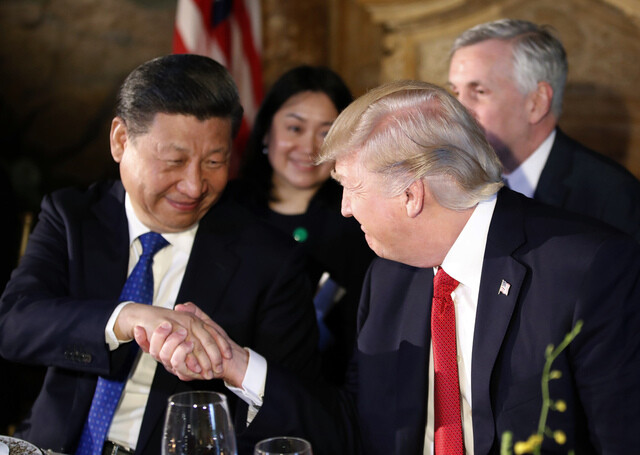hankyoreh
Links to other country sites 다른 나라 사이트 링크
[Editorial] Where is South Korea in Trump and Xi’s push to address Korean peninsula crisis?

In an unusual development, US President Donald Trump and Chinese President Xi Jinping spoke again by telephone about the North Korean nuclear issue on Apr. 12, five days after their summit ended. The mood suggests something serious might have happened on the Korean Peninsula.
Trump has been bringing up the North Korean issue several times in media interviews over the past few days. Every time, his position has been a tough line. Many of his remarks seem aimed at ratcheting up military pressure in the wake of the aircraft carrier USS Carl Vinson’s return to the Korean Peninsula, such as when he noted that the US also has nuclear submarines and said its military was the most powerful on the planet. He has also tried to get Beijing on board with the pressure against Pyongyang by insisting that the US will take action on its own if it doesn’t cooperate and offering reassurances that he will not designate China as an exchange rate manipulator.
The problem is that there is no sign of South Korea anywhere in the Trump administration’s push. In terms of a resolution to the Korean Peninsula issue, it certainly is important to have discussions taking place between the US and China. But it’s a huge problem when one of the key parties appears to have been completely cut out of the decision-making framework. The South Korean government has yet to give a clear answer on whether it was notified in advance of the Carl Vinson’s change in course toward the Korean peninsula. During an Apr. 13 appearance before the National Assembly Foreign Affairs and Unification Committee, Minister of Foreign Affairs Yun Byung-se said the sharing of North Korea intelligence was “taking place on an almost real-time basis.” If that’s the case, it would mean Yun himself is throwing his support behind the Trump administration’s actions, which are all about stirring up tensions on the peninsula in order to create a more favorable negotiation climate - an approach that does grave damage to South Korea’s national interest. Yun has also said there is “not a shred of difference between South Korea and the US in their assessment of the seriousness and urgency of the North Korean nuclear threat.” The appearance of things, however, suggests Seoul may have been left out of the discussion loop entirely.
Instead, it appears to be Xi who is doing the job of calming Trump down. Some observers have praised what they describe as Trump’s “negotiation technique.” But if it doesn’t lead to a change in North Korea’s attitude, there’s a danger of the peninsula more and more turning into a confrontation between two extremes. Another fear factor is Trump’s unpredictable and inconsistent temperament. The North Korean nuclear issue isn’t something that can be resolved through sanctions alone, and South and North Korea could both find themselves facing serious troubles in the process. Our current government may be a transitional one, but shouldn’t it still send the clear message that a preemptive strike is not an option?
Please direct questions or comments to [english@hani.co.kr]

Editorial・opinion
![[Column] Season 2 of special prosecutor probe may be coming to Korea soon [Column] Season 2 of special prosecutor probe may be coming to Korea soon](https://flexible.img.hani.co.kr/flexible/normal/500/300/imgdb/original/2024/0426/3317141030699447.jpg) [Column] Season 2 of special prosecutor probe may be coming to Korea soon
[Column] Season 2 of special prosecutor probe may be coming to Korea soon![[Column] Park Geun-hye déjà vu in Yoon Suk-yeol [Column] Park Geun-hye déjà vu in Yoon Suk-yeol](https://flexible.img.hani.co.kr/flexible/normal/500/300/imgdb/original/2024/0424/651713945113788.jpg) [Column] Park Geun-hye déjà vu in Yoon Suk-yeol
[Column] Park Geun-hye déjà vu in Yoon Suk-yeol- [Editorial] New weight of N. Korea’s nuclear threats makes dialogue all the more urgent
- [Guest essay] The real reason Korea’s new right wants to dub Rhee a founding father
- [Column] ‘Choson’: Is it time we start referring to N. Korea in its own terms?
- [Editorial] Japan’s rewriting of history with Korea has gone too far
- [Column] The president’s questionable capacity for dialogue
- [Column] Are chaebol firms just pizza pies for families to divvy up as they please?
- [Column] Has Korea, too, crossed the Rubicon on China?
- [Correspondent’s column] In Japan’s alliance with US, echoes of its past alliances with UK
Most viewed articles
- 1Samsung subcontractor worker commits suicide from work stress
- 2‘We must say no’: Seoul defense chief on Korean, USFK involvement in hypothetical Taiwan crisis
- 3[Editorial] Korea’s surprise Q1 growth requires objective assessment, not blind fanfare
- 4No good, very bad game for Korea puts it out of Olympics for first time since 1988
- 5Division commander ordered troops to enter raging flood waters before Marine died, survivor says
- 6N. Korean delegation’s trip to Iran shows how Pyongyang is leveraging ties with Moscow
- 7Korea’s 1.3% growth in Q1 signals ‘textbook’ return to growth, says government
- 8US overtakes China as Korea’s top export market, prompting trade sanction jitters
- 9[Column] Park Geun-hye déjà vu in Yoon Suk-yeol
- 10[Column] Season 2 of special prosecutor probe may be coming to Korea soon